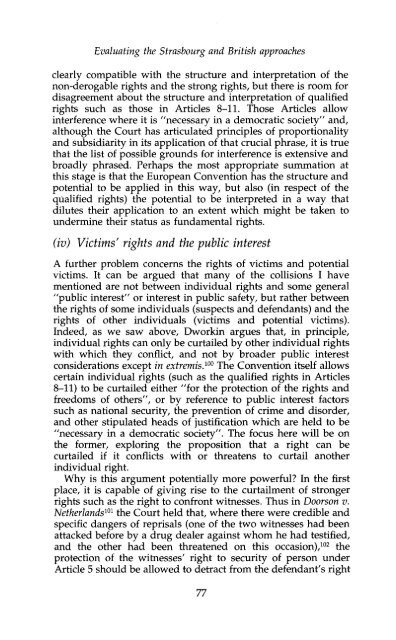Human Rights, Serious Crime and Criminal Procedure - College of ...
Human Rights, Serious Crime and Criminal Procedure - College of ...
Human Rights, Serious Crime and Criminal Procedure - College of ...
- No tags were found...
Create successful ePaper yourself
Turn your PDF publications into a flip-book with our unique Google optimized e-Paper software.
Evaluating the Strasbourg <strong>and</strong> British approachesclearly compatible with the structure <strong>and</strong> interpretation <strong>of</strong> thenon-derogable rights <strong>and</strong> the strong rights, but there is room fordisagreement about the structure <strong>and</strong> interpretation <strong>of</strong> qualifiedrights such as those in Articles 8-11. Those Articles allowinterference where it is "necessary in a democratic society" <strong>and</strong>,although the Court has articulated principles <strong>of</strong> proportionality<strong>and</strong> subsidiarity in its application <strong>of</strong> that crucial phrase, it is truethat the list <strong>of</strong> possible grounds for interference is extensive <strong>and</strong>broadly phrased. Perhaps the most appropriate summation atthis stage is that the European Convention has the structure <strong>and</strong>potential to be applied in this way, but also (in respect <strong>of</strong> thequalified rights) the potential to be interpreted in a way thatdilutes their application to an extent which might be taken toundermine their status as fundamental rights.(iv) Victims' rights <strong>and</strong> the public interestA further problem concerns the rights <strong>of</strong> victims <strong>and</strong> potentialvictims. It can be argued that many <strong>of</strong> the collisions I havementioned are not between individual rights <strong>and</strong> some general"public interest" or interest in public safety, but rather betweenthe rights <strong>of</strong> some individuals (suspects <strong>and</strong> defendants) <strong>and</strong> therights <strong>of</strong> other individuals (victims <strong>and</strong> potential victims).Indeed, as we saw above, Dworkin argues that, in principle,individual rights can only be curtailed by other individual rightswith which they conflict, <strong>and</strong> not by broader public interestconsiderations except in extremis. 100 The Convention itself allowscertain individual rights (such as the qualified rights in Articles8-11) to be curtailed either "for the protection <strong>of</strong> the rights <strong>and</strong>freedoms <strong>of</strong> others", or by reference to public interest factorssuch as national security, the prevention <strong>of</strong> crime <strong>and</strong> disorder,<strong>and</strong> other stipulated heads <strong>of</strong> justification which are held to be"necessary in a democratic society". The focus here will be onthe former, exploring the proposition that a right can becurtailed if it conflicts with or threatens to curtail anotherindividual right.Why is this argument potentially more powerful? In the firstplace, it is capable <strong>of</strong> giving rise to the curtailment <strong>of</strong> strongerrights such as the right to confront witnesses. Thus in Doorson v.Netherl<strong>and</strong>s 101 the Court held that, where there were credible <strong>and</strong>specific dangers <strong>of</strong> reprisals (one <strong>of</strong> the two witnesses had beenattacked before by a drug dealer against whom he had testified,<strong>and</strong> the other had been threatened on this occasion), 102 theprotection <strong>of</strong> the witnesses' right to security <strong>of</strong> person underArticle 5 should be allowed to detract from the defendant's right77
















